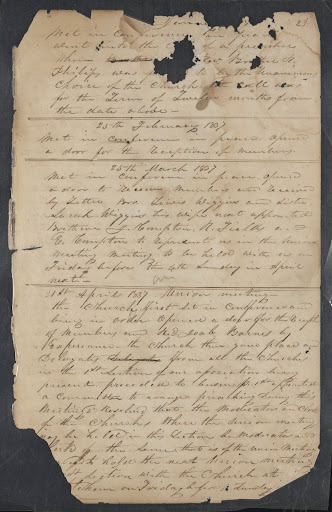In collaboration with Island Ford Baptist Church, the DLG is excited to announce the digitization of the Island Ford Baptist Church Historic Documents, Buford, Georgia Collection.
The Island Ford Baptist Church Historic Documents offer invaluable insights into the history and culture of Buford, Gwinnett County, Georgia, during pivotal times in United States history. This significant project has preserved and made accessible historical records spanning from the 19th to early 20th centuries, expanding research opportunities for African American genealogists researching enslaved persons who were laid to rest at Island Ford, and anyone seeking vital records prior to 1919, when the state of Georgia began collecting such data.
The collection includes original handwritten documents, transcriptions, historical writings, and newsletters, providing a comprehensive view of life in Gwinnett County from the early 1800s to the early 1900s, with documentation of names listed, cross-referenced with census records and enslaved persons schedules from 1820-1860.
Previously, access to these materials was limited to personal visits or requests to the Georgia Archives. With digital facsimiles now available through the Digital Library of Georgia (DLG), individuals worldwide can explore the rich history of Island Ford Baptist Church and its surrounding community.
The digitized collection is available at https://dlg.usg.edu/collection/ifbc_ifbc-nsdar.
About the Island Ford Baptist Church (Buford, Ga.)
Island Ford Baptist Church is located in Buford, Georgia. The City of Sugar Hill, Georgia also includes it as one of the primary historical churches in the early settlement of its community. Founded in 1832, Island Ford Baptist Church is believed to be one of the oldest in Gwinnett County. Its first building, made of pine logs, was constructed in 1833. The Island Ford Baptist Church family partnered with the Suwanee Creek Chapter, NSDAR to organize and transcribe the content of this collection. The project was supported by members of the Island Ford Baptist Church family, members of the Suwanee Creek Chapter, NSDAR, the Sugar Hill Historic Preservation Society, and the Black Women’s Association of Sugar Hill. These efforts were recognized by the Gwinnett Historical Society where the original documents will be kept in archival storage.
Selected images from the collection:
Title: Bound book of historic documents
URL: https://dlg.usg.edu/record/ifbc_ifbc-nsdar_if05
Description:
A book bound with original documents written between 1833 and 1917 and later microfilmed at the Georgia Archives on September 29, 1976. At that time, the Georgia Archives laminated each page and bound the documents into a book.
The document includes church conference minutes that mention church members by name, church membership lists separated into groups of male and female members, lists of deaths, several iterations of the Constitution of the Island Ford Baptist Church, land information about Gwinnett County, and notes on interactions with other Baptist churches in the area. In most cases, the documents were written by the church clerk.
Note: Page 203 (page 209 of the PDF file) records the day (13 Nov 1835) that an African American woman identified as “Sister Abby, Property of E Bagby,” joined the church.
Collection: The Island Ford Baptist Church Historic Documents, Buford, Georgia Collection
Courtesy of the Island Ford Baptist Church (Buford, Ga.) and the Gwinnett Historical Society
Title: Document C
URL: https://dlg.usg.edu/record/ifbc_ifbc-nsdar_if03
Collection: The Island Ford Baptist Church Historic Documents, Buford, Georgia Collection
Description: The document describes the Island Ford Baptist Church proceedings from January to June 1837. It chronicles meetings over several months, detailing matters such as the selection of a preacher, the reception of new members, and issues of fellowship and reconciliation within the congregation. Committees were appointed to address disputes and allegations during a period of growth and community engagement, reflecting the church’s commitment to maintaining harmony amongst its members.
Courtesy of the Island Ford Baptist Church (Buford, Ga.) and the Gwinnett Historical Society






